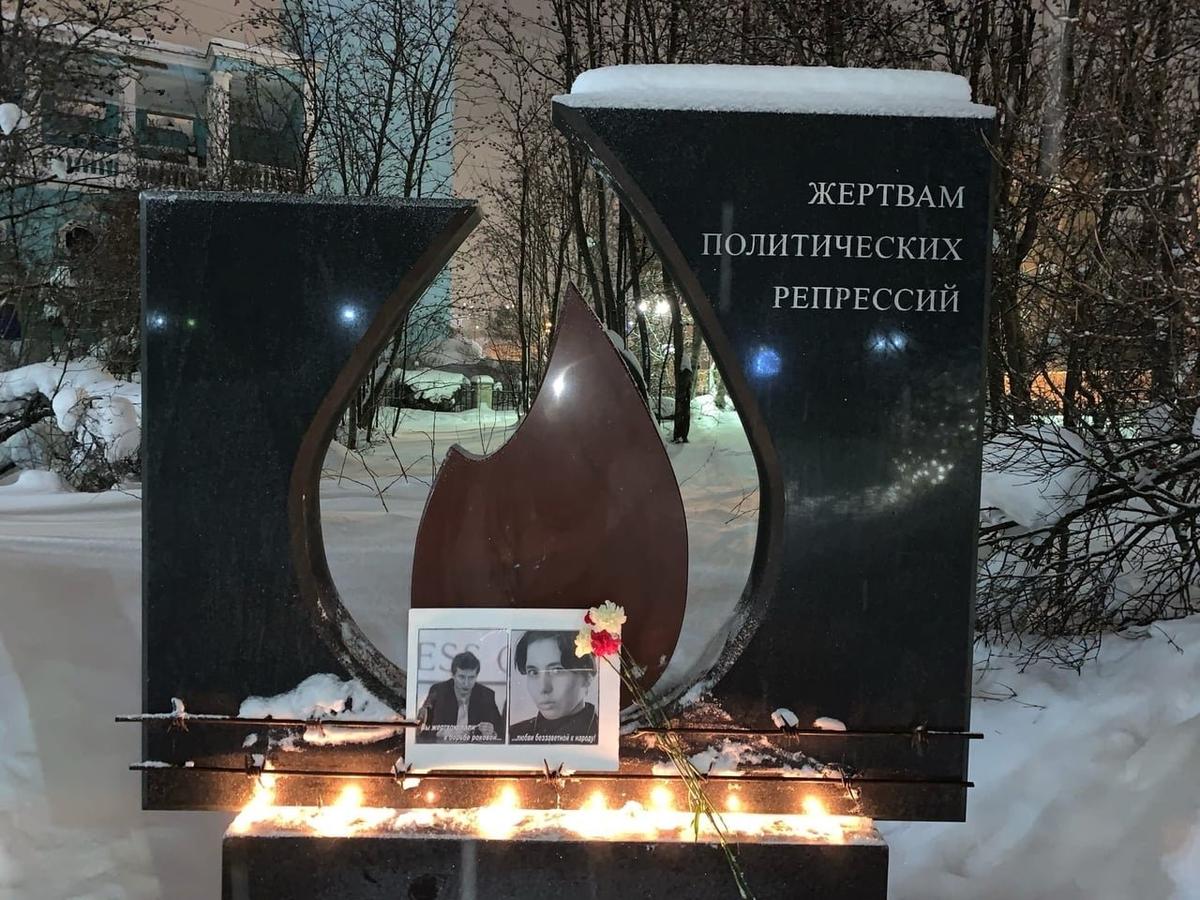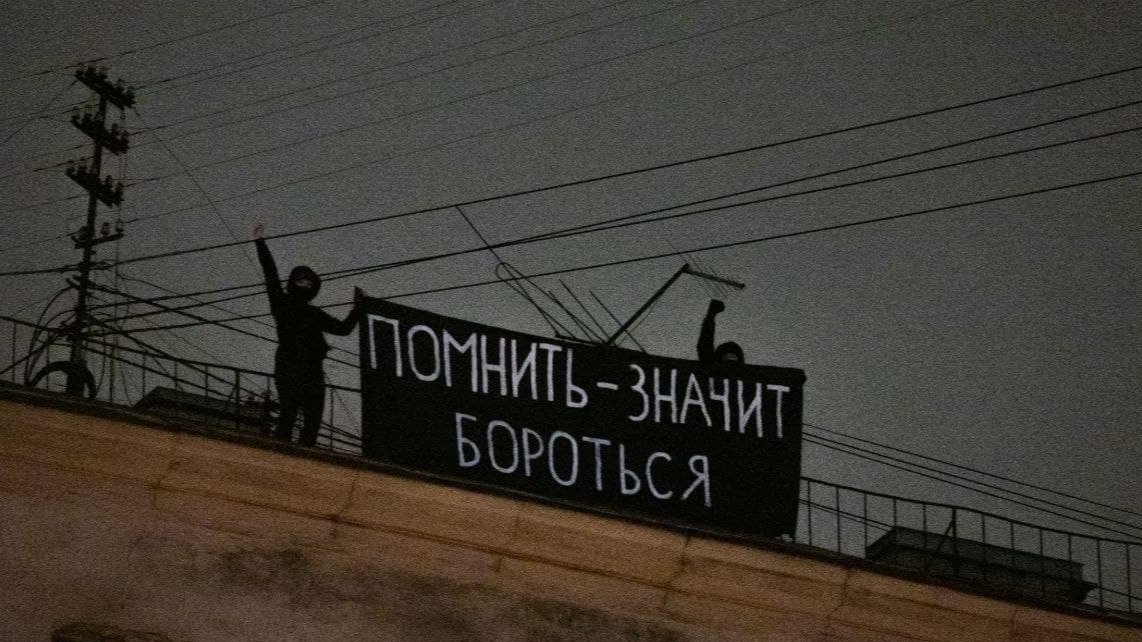Novaya-Europe is publishing this article because it is an important example of deconstructing the new status quo in the Russian Federation where war has become possible following years of persecution and murder of anti-fascists. The editorial office is not necessarily in agreement with the author (and Theodor W. Adorno) when it comes to the assessment of the genesis of fascism.
In the past days, vigils in memory of lawyer Stanislav Markelov and Novaya Gazeta journalist Anastasia Baburova, who were killed 14 years ago on 19 January by neo-Nazis Tikhonov and Khasis, have been taking place in Russia and other countries. The vigil tradition has been kept alive all these years by the victims’ friends and supporters, who together had founded the 19 January Committee.
Every year, the Committee talks about new signs of fascism engulfing the country. About the anti-migration, racist, militarist rhetoric legalised by media, about the fact that imperialists, nationalists, and ultra-conservators have been taking over science and education, about friends of murderers becoming government officials, about them being helped by repressions carried out against opposition journalists and human rights defenders. But the actual words fascism and anti-fascism, we will admit, have not been considered relevant by many for all those years. Which is why it is even weirder that we are currently seeing events straight from a history textbook develop in front of our eyes.

Photo: Monument to the victims of political repressions in Murmansk / Facebook
What is fascism made of in today’s Russia? There is a sadness over the lost great country that was torn apart by external enemies. There is the idea of an integral organic community, a united Russian people, that the same enemies are trying to tear apart. There are some of these people that are in need of saving by making them join Russia, together with the “original” territory. There is an understandable human compassion towards residents of Donbas, turned into a powerless, revanchist aggression by the propaganda. There is the rhetoric of a “national liberation” war against the decaying West that wants to infect an unspoiled civilisation with its sickness.
Finally, there are private paramilitary structures to carry out different foreign and domestic political tasks. Tasks that are sometimes difficult to get done in the government, even an authoritarian one, seeing as there are always some “bourgeois-democratic” formalities present. Stagnation and corruption are found in the government and its bureaucracy, while direct recruitment of mercenaries allows for getting by without both.
The Soviet history, the Victory in WWII, and its symbols helped “sell” all of this to a big part of the nation. Allegedly, everything that is done in the name of anti-fascism cannot be fascism by definition. Yet, it can.
All of post-Soviet capitalism is a straight path to a fascist dictatorship. All of its history surprisingly confirms the principal leftist dogma of fascism. It says that fascism appears when the bourgeois, out of fear of a revolution from below and big changes, transfers power to a more cruel and dangerous force that does not directly infringe upon private property.
A force able to draw the masses’ attention to something more entertaining and epic than the conversation about redistributing the money to the poor. All of post-Soviet history, starting from 1993, is the transfer of power to some or other forces that act as the “lesser evil” — all out of fear of protests and revolts.
But fascism is impossible without an anti-liberal emotion, too. Anti-liberalism void of a clear redistribution and democracy programme is,
paraphrasing a famous quote, “socialism for idiots”. It is needed to make a strictly elite fascist ideology appealing to the masses.
According to another leftist notion, fascism is a reaction to the rise of labour movements. In our case, fascistisation was a reaction to the rise of a movement with an anti-corruption, anti-oligarchy, redistribution agenda. A movement that was quick to learn how to get people to go to the streets and win elections. It brought forward dozens of leaders across the country and would easily surpass Navalny’s leadership if it continued progressing. The war and a massive fascistisation spiral of the last year were the answer.
Support independent journalism
An external intervention is always, among other things, a social and class offensive inside the country. We have been seeing this offensive since February 2022 — from fabricated cases initiated against union members to the attempts to cancel the Shies defenders’ victory that has been a long point of contention for the government.
From the introduction of the “mobilisation economy” that allows to demand work at odd hours from employees to the attempts to legalise work of teenagers as young as 14. The war allows the government and the “inner circle” bourgeoisie realise their small and big desires. Grassroots movements have been weakened due to fear, repressions, and the decision of many to flee the country. Also due to infighting — instead of uniting in the fight against rulers and oligarchs, activists are fighting with each other about Ukraine.
But sooner or later, there will come a time to admit that a social, ecological, or labour activist that supports the aggression war started by the government under fake national slogans automatically renounces their own and common fights, renders all previous efforts and sacrifices pointless.
What does it lead to? Italian fascists, at first, talked about awakening the Italian nation to active and conscious life. Later, it turned out that the only people who need to awaken to a political life are the ones loyal to a certain ideology. Society in general should instead be paralysed. To achieve this goal, those who disagreed were forcefully fed castor oil and shamefully displayed, and thus, made to go back to a humble, private life.
Here, people with sledgehammers have already started appearing during police searches. Then, if we follow the logic, they will be thrown at those who want to at least somehow fight for their rights. Soldiers’ mothers, workers, eco-defenders, not to mention the anti-war people. Many of those who supported the war publicly — artists, journalists, politicians, the most shameful “communists” among them — now have no way out. They are scared of a fair trial for participating in the elimination of a neighbouring and their own countries, so they will count on the authorities and fascists, will continue kissing up until the end. But the rest of Russians that actively or passively supported the war, hoping that it would make the country stronger, still have a chance to renounce this terrible delusion.
Fascism is on the horizon, but nothing has been decided yet. There are still issues with its main component — a mass ideological grassroots movement. The government represented by Putin and his inner circle is still trying to keep itself afloat by controlling the state’s law enforcement at one end and pogromist private companies at the other. Okay, Italian latifundistas and German industrialists, as well as politicians like Hindenburg, who eventually passed the power to Nazis, also had a lot of hopes at the beginning.
Who could pull the emergency brakes? Maybe, some soldiers will dare to put a stop to the destruction of their people in the Ukrainian massacre and the spree of criminals with sledgehammers? Or some part of the elites will get bored of grovelling in front of fascist scum that has captured the country and has been tearing it apart? We do not know whether these people will appear, we do not know their names, and we certainly should not put our hopes on them. But we know the names of the civic society without which there will be no transit to the future. These names are Stanislav Markelov and Anastasia Baburova. Thank you to everyone who came out in different cities and countries in the past days, especially to those who did so in Russia.
Join us in rebuilding Novaya Gazeta Europe
The Russian government has banned independent media. We were forced to leave our country in order to keep doing our job, telling our readers about what is going on Russia, Ukraine and Europe.
We will continue fighting against warfare and dictatorship. We believe that freedom of speech is the most efficient antidote against tyranny. Support us financially to help us fight for peace and freedom.
By clicking the Support button, you agree to the processing of your personal data.
To cancel a regular donation, please write to [email protected]

